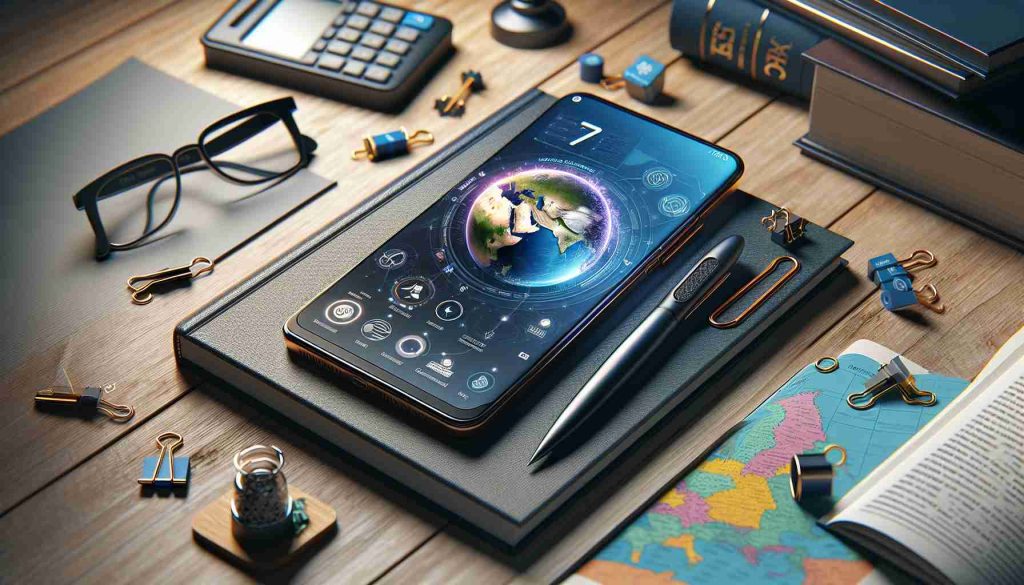In an unprecedented growth in the global smartphone market, the third quarter of 2024 soared with a remarkable 309.9 million units sold, marking a significant 5% increase from last year. The transformative role of Artificial Intelligence (AI) combined with an iPhone upgrade cycle has been pivotal to this success.
Industry insiders note the launch of Apple’s stellar iPhone 16 series as a significant contributor to these record-breaking figures, marking the highest sales peak in the past three years. The series has enthralled consumers with cutting-edge AI capabilities designed to enhance the user experience. Its robust A18 chip and the groundbreaking integration of AI concerning everyday tasks make it a standout in the market.
Samsung continues to lead the industry with an impressive 57.5 million shipments, while Apple follows closely with a record-setting 54.5 million units sold, bolstered by the iPhone 16’s popularity. Behind them, Xiaomi holds strong, delivering 42.8 million units, as OPPO and vivo secure the fourth and fifth positions with 28.6 million and 27.2 million shipments, respectively.
Compelling models like the OPPO A3 and Samsung Galaxy S24 Ultra indicate high competition within the mid-range and premium categories. OPPO’s A3 shines with its durability and water resistance, while the Samsung S24 Ultra dazzles with its 200MP camera and powerful Snapdragon 8 Gen3 SoC for optimal gaming experiences.
This flourishing landscape, with fierce competition and novel tech developments, suggests promising days ahead for smartphone enthusiasts and highlights AI’s profound impact on modern technology. Industry analysts remain optimistic about continuous innovation driving further market expansion in the coming years.
AI Revolutionizing the World: Beyond Smartphone Sales
The global smartphone market is experiencing a transformative era, with Artificial Intelligence (AI) at the heart of its resurgence. While the market’s growth to 309.9 million units sold in the third quarter of 2024 showcases increased consumer interest, the true influence of AI extends far beyond the raw sales figures. Let’s explore the novel impacts, controversies, and the practical implications of this AI revolution on communities, lifestyles, and economies worldwide.
Transformative Impacts on Daily Life
AI’s integration into smartphones is redefining user interactions and lifestyle management. With AI making phones smarter and more efficient, tasks like scheduling, photography, and even personal health tracking have become more intuitive and personalized. For instance, AI algorithms now enable smartphones to predict users’ needs, suggesting apps, reminders, and activities based on past behavior patterns. This proactive assistance is helping individuals manage their time more effectively, enhancing productivity and work-life balance.
Economic Implications for Communities and Countries
The growth in smartphone adoption, driven by advancements in AI, is creating new job opportunities and economic growth. As tech companies invest in AI research and development, there’s a burgeoning demand for skilled professionals in AI and machine learning. This trend is catalyzing educational reforms, with more institutions offering AI specializations, thus preparing a future-ready workforce.
Moreover, countries with robust technology sectors are observing a positive ripple effect on their economies. The smartphone boom encourages related industries, such as app development and telecommunication infrastructure, to also flourish, contributing to GDP growth.
Controversies and Challenges
However, the AI revolution is not without its controversies. Privacy concerns are at the forefront, with AI’s data-heavy approach necessitating the collection of vast amounts of personal information. Consumers are often wary of how their data is used and the potential for misuse by tech giants.
Another challenge is the digital divide. As AI-enhanced smartphone models dominate the market, there is a risk of creating a technology gap, where those who cannot afford the latest models are left behind in the digital world. This divide can exacerbate socioeconomic disparities, limiting access to the benefits that AI in technology brings.
Advantages and Disadvantages
The advantages of integrating AI into smartphones are profound. Improved efficiency, enhanced user experience, and the ability to perform complex tasks effortlessly are significant benefits. AI also drives innovation, pushing boundaries and encouraging continuous technological advancement.
On the downside, the rapid pace of AI development can lead to obsolescence, where consumers feel pressure to constantly upgrade their devices for fear of falling behind. This obsolescence contributes to e-waste, presenting environmental challenges that the tech industry must address.
Frequently Asked Questions
1. How does AI impact smartphone battery life?
AI can optimize battery usage by learning user habits and adjusting settings to conserve power. However, high-performance AI features can also strain batteries if not managed properly.
2. Can AI be considered a driver for social change?
Absolutely. AI in smartphones can enhance communication, education, and access to information, potentially leveling the playing field for underserved communities.
For more information on AI’s broader impacts on society, visit WIRED and TechCrunch.
As we stand on the cusp of an AI-driven future, the implications for individuals, communities, and nations are profound and multifaceted. While there are challenges and ethical considerations to navigate, the potential to enhance human experience is immense, promising a future where technology and human life are harmoniously intertwined.























